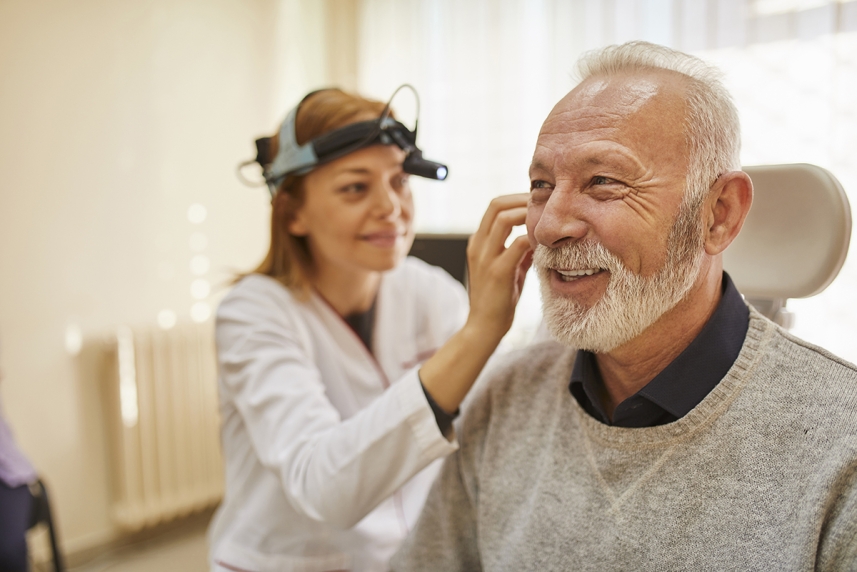Making the most of your UnitedHealthcare Hearing and Vision benefits
This powerful pair covers routine screenings that catch problems before they become serious.

You might be tempted to skip signing up for vision or hearing insurance during Open Enrollment, especially if you’ve got 20/20 vision and no problems hearing. But research shows that even a small amount of hearing loss can affect your cognitive abilities, your mental health, and increase your risk of falls.1 The same is true of vision loss.2
So taking advantage of the benefits offered by each plan can boost your overall health without making a big dent in your budget. And you may save even more money by catching problems early, when they’re more easily treated.
Here’s what UnitedHealthcare Hearing and Vision benefits cover and how to make the most of them.
UnitedHealthcare Vision offers a huge selection of designer eyeglasses — and vision insurance can help pay for them.
What your UnitedHealthcare Hearing plan may cover
With UnitedHealthcare Hearing, you get a no-cost hearing exam, access to a nationwide network of licensed hearing care professionals, and one of the widest selections of hearing aids to choose from – at significant savings. We have options to fit every budget and lifestyle, including devices with powerful app and AI integrations that help seamlessly integrate your devices into your day-to-day and over-the counter options.
Visit a network hearing care professional
Our licensed hearing care professionals provide friendly, expert guidance to help you find the right solution for your hearing needs. With more than 7,000 providers nationwide, most individuals are within an average of 6.6 miles of a provider.* Plus, you can explore convenient online appointment options with select providers and devices.
Support every step of the way
Addressing your hearing loss is a big step, but you’re not doing it alone. Follow-up appointments with your hearing care provider are included and a 60-day trial period means you have the time and support you need to adjust to your new hearing aids.** Plus, your hearing aids will be covered by a 3-year warranty that includes repair, plus a one-time replacement if they are lost or damaged.***
Why you should use your hearing benefit
About 1 in 3 adults ages 65 to 74 have hearing loss, as do nearly half of people ages 75 and older.4 However, age isn’t the only risk factor for hearing loss. Being around loud noises, having certain conditions such as diabetes, and ear infections can all damage your hearing.5
Hearing loss impacts more than just your ability to hear. People who can’t hear may feel cut off from their friends and family, which can lead to loneliness, depression and even dementia. It also can affect your safety. Even a little bit of hearing loss can triple the risk of falls if you’re over 65. The less you hear, the greater the risk of taking a tumble.6
If you have hearing loss, using hearing aids can help protect against social isolation, dementia, injury from falls and help preserve mental capabilities. Taking advantage of your no-cost hearing test and consultation through UnitedHealthcare Hearing is an important first step in taking care of your hearing and protecting your overall health and well-being.
Make a hearing care appointment today. Visit UHCHearing.com to get started.
What your UnitedHealthcare Vision plan may cover
With your UnitedHealthcare Vision plan, you may get a comprehensive eye exam every year for a copay. Pregnant and breastfeeding moms, and kids age 19 or younger, get 2 eye exams a year because their vision may change quickly.
Your vision plan may also give you an allowance to buy glasses with standard lenses. If you stick to the allowance, the glasses are no cost. If you want extras, like progressive or anti-reflective lenses, or if you choose frames that cost more than your plan’s allowance, you pay the difference in price. Are you a contact lens wearer? Your plan may cover them as well. Vision plans may vary, be sure to check your coverage at myuhcvision.com.
Why you should use your vision benefit
A comprehensive eye exam includes more than just a vision screening.
Your eye doctor will check every part of your eye to look for possible health problems. Those can include such serious eye conditions as glaucoma and macular degeneration. Most eye conditions don’t have symptoms at first, but an eye doctor can spot them early on — and treat them before you lose your eyesight.
Eye doctors can also detect more than 270 serious diseases, including diabetes, heart disease and even cancer. In fact, in 2018 optometrists found signs of diabetes in 301,000 patients who didn’t know they had the disease.7
How to stay on track with medical appointments
It can be easy to put off making appointments, especially if you don’t notice any issues with your vision or hearing. If this sounds like you, try this trick: Book appointments around the time of year when the clock changes to daylight or standard time. For example, you could get your hearing checked each March, then see your eye doctor each November. If you live in a state that doesn’t observe daylight saving time, book visits near the first days of spring and fall. The payoff? You’ll be safeguarding your precious eyesight and hearing.
You can find your favorite contact brands, including Acuvue, Biotrue and Air Optix, at UnitedHealthcare Vision. Stock up on contacts now.
Disclaimers
* Network size may vary by location.
** Hearing aids purchased in the Silver technology level will receive 1 follow-up visit. Hearing aids purchased using virtual care and direct delivery receive virtual follow up visits.
*** One-time professional fee may apply.
Sources:
- Hearing Loss: A Common Problem in Older Adults National Institute on Aging, last reviewed January 2023.
- Making Eye Health a Population Health Imperative: Vision for Tomorrow National Center for Biotechnology Information.
- UnitedHealthcare internal data.
- Age-Related Hearing Loss National Institute on Deafness and Other Communication Disorders, updated March 2023.
- Hearing Loss: A Common Problem for Older Adults National Institute on Aging, updated January 2023.
- For older adults, hearing loss and falls go hand in hand UT Southwestern Medical Center, July 2022.
- What’s a Doctor of Optometry? American Optometric Association.


